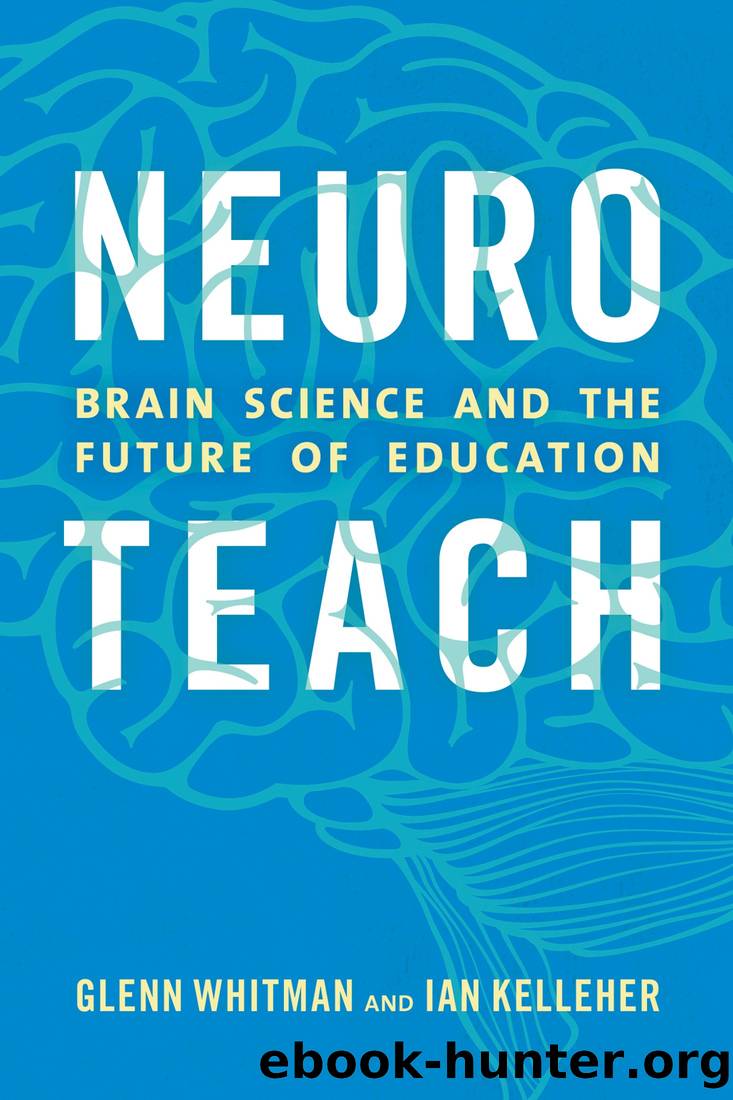Neuroteach: Brain Science and the Future of Education by Glenn Whitman & Ian Kelleher

Author:Glenn Whitman & Ian Kelleher [Whitman, Glenn & Kelleher, Ian]
Language: eng
Format: epub
Tags: education, Professional Development
ISBN: 9781475825343
Google: i_xjjwEACAAJ
Publisher: Rowman & Littlefield
Published: 2016-11-15T00:00:00+00:00
Active Retrieval of Information
A growing body of research suggests that actively retrieving information by self-testing produces significant long-term benefits for learning compared with passive studying, such as merely reading oneâs class notes.10 While any assessment requires some type of active retrieval, having students reconstruct what they know through alternative assessments leads to deeper understanding and consolidates learning in more powerful ways than traditional testing.11
Active retrieval is also crucial as students prepare for assessments. Too often, when we ask students to reflect on their study strategies, they say they simply âreread class notes.â Research tells us that this is not an effective or time-efficient strategy. Training students to build regular self-testing into their study strategies will help them embed material into their long-term memory.12
The act of trying to recall something aids long-term memory storage and recovery. By long-term memory, neuroscientists mean, and teachers should be aiming for, not just the end-of-unit or even end-of-semester test, or even the end of year final exam. When we talk about long-term memory, what we mean is, what endures beyond this? Getting to this point takes, as we discuss in chapter 5, both hard work and smart work.
As we like to say to our students, they must develop deliberate study habits and we recognize that âone needs motivation in order to enter into and sustain the hard work of deliberate practice. But the learning happens not simply through putting in the hours, but through doing so intelligently.â13 We feel that it is the role of the teacher to help students with this, embedding research-informed strategies at well-timed moments alongside content, and not just leaving learning to chance. One example is to provide students with recall opportunities while coaching them on how to be good at this strategy. Since studying this way may feel harder at times for students, there is an element of emotional support here, too.
Download
This site does not store any files on its server. We only index and link to content provided by other sites. Please contact the content providers to delete copyright contents if any and email us, we'll remove relevant links or contents immediately.
Spare by Prince Harry The Duke of Sussex(5176)
Navigation and Map Reading by K Andrew(5150)
Tuesdays with Morrie by Mitch Albom(4770)
Machine Learning at Scale with H2O by Gregory Keys | David Whiting(4293)
Cracking the GRE Premium Edition with 6 Practice Tests, 2015 (Graduate School Test Preparation) by Princeton Review(4280)
Never by Ken Follett(3937)
Goodbye Paradise(3799)
What It Really Takes to Get Into Ivy League and Other Highly Selective Colleges by Hughes Chuck(3751)
Fairy Tale by Stephen King(3370)
Harry Potter and the Prisoner of Azkaban (Book 3) by J. K. Rowling(3350)
Pledged by Alexandra Robbins(3170)
Kick Ass in College: Highest Rated "How to Study in College" Book | 77 Ninja Study Skills Tips and Career Strategies | Motivational for College Students: A Guerrilla Guide to College Success by Fox Gunnar(3118)
Reminders of Him: A Novel by Colleen Hoover(3092)
A Dictionary of Sociology by Unknown(3073)
Sapiens and Homo Deus by Yuval Noah Harari(3068)
The Social Psychology of Inequality by Unknown(3018)
Will by Will Smith(2910)
Graduate Admissions Essays, Fourth Edition: Write Your Way into the Graduate School of Your Choice (Graduate Admissions Essays: Write Your Way Into the) by Asher Donald(2907)
Zero to Make by David Lang(2778)
